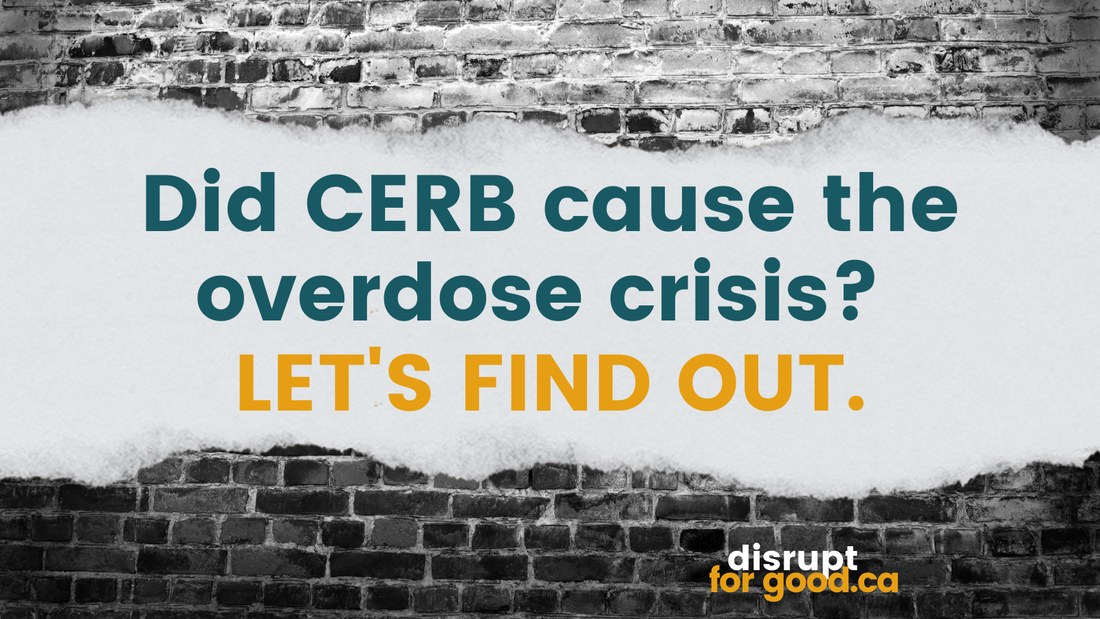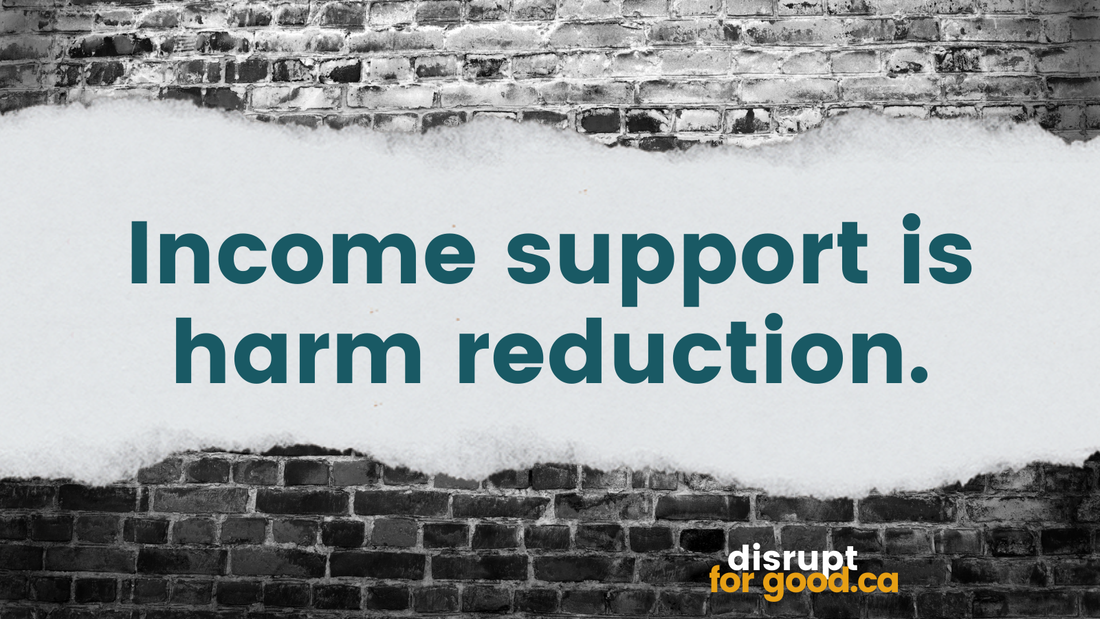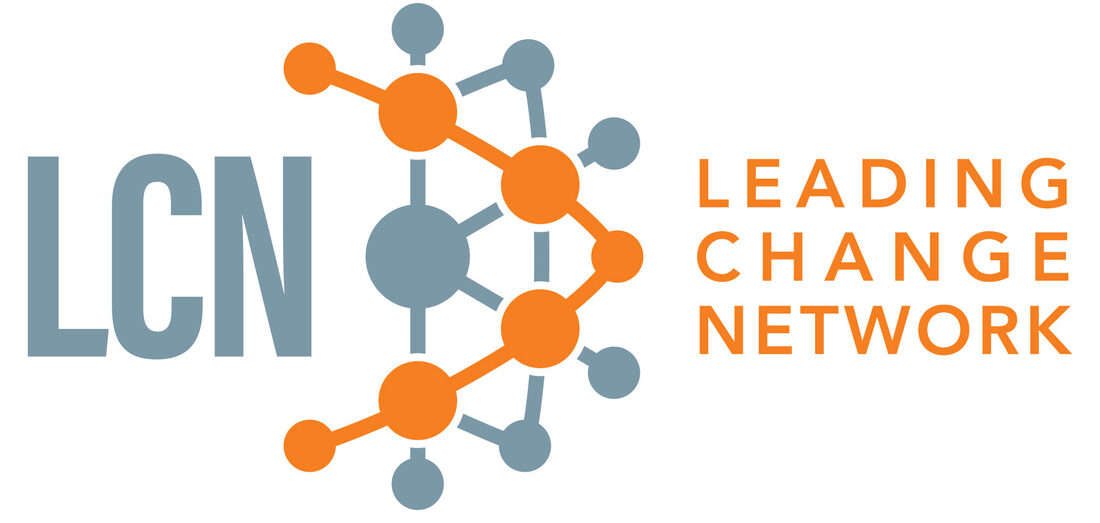|
So, as the story goes, the Canada Emergency Response Benefit (CERB) -- a temporary income support of $500 a week during the COVID-19 pandemic -- caused the overdose crisis. Or at least contributed to it heavily. This story is used to prop up the idea that giving money to people who use drugs is not in their own best interest (I've even heard it called a "death wish") because they'll use that money to buy a whole bunch of extra drugs, and die. Friends, this story is startlingly accepted as fact, even among those who work to support people who use drugs. But it's just not true. In this post, I'll point to sources that debunk this myth, explain why it is very dangerous, and suggest a new narrative. (Because by now we know that saying, "No, CERB didn't cause the overdose crisis" just gives that false story oxygen. We need a new narrative using new words.) Buckle up. Why it's incorrectLuckily for us, this "CERB caused the overdose crisis" narrative falls apart pretty quickly upon inspection. Smarter folks than I have itemized the ways that this is a simple case of correlation, not causation. I'll turn to the words of Dr. Hakique Virani, a public health and preventive medicine and addiction medicine specialist and associate clinical professor in the University of Alberta’s Faculty of Medicine and Dentistry. His Twitter thread takedown was epic. I'll share some of it here: Temporality: For CERB to have caused an increase in fatal ODs, the program would have had to start before the increase. However, the surge in deaths started in March (Up 19% from February in ON, 53% in BC, 43% in AB). However, you couldn’t even apply for CERB until April 6th and payments didn’t start until mid-April. Dose-response: In causal relationship, an increase in incidence = increase in exposure: In April 2020, CERB statistics were the same in each province, but increases in OD deaths were 29% in ON, 4.3% in BC, 26% in AB Coherence with established evidence: The literature shows financial *insecurity*, not financial support, contributes to higher risk substance use and poorer health outcomes. The "CERB made ODs go up" narrative isn't just inconsistent with the science. It's *opposite* to it. More plausible than other explanations? The mechanism suggested for the "CERB effect" is that when you give extra money to people previously living on less than we need to survive (that's the *actual* problem), they buy a bunch of drugs and die. So fatality rates go up. This simplistic logic may appeal to people who value rare anecdotes over population-level evidence or to those who believe poor people are somehow unable to make "good" financial decisions. But there is a far more likely explanation for the rise in fatal ODs than "CERB did it." COVID-19 disrupted drug supply chains. The United Nations Office on Drugs and Crime saw it. The Canadian Community Epidemiology Network on Drug Use saw it. Dr. @EHyshka saw it (which is basically the most important thing to know). Just like when OxyContin was reformulated into a tamper-deterrent product, the illegal drug market resorted to new ways of procuring and synthesizing other, necessarily more potent opioids that are easier to traffic. The result? A less predictable, more toxic supply. This explanation is consistent with post-mortem toxicology findings of higher concentrations of opioids, and our clinical observation of more fentanyl analogs in higher concentrations in urine specimens of people seeking treatment for substance use conditions. It is also consistent with reports from patients that, increasingly, drugs from the street have a less predictable effect than before, which is an even greater concern given the increased likelihood of using alone during the pandemic. This isn't to say that there can't have been unintended harms associated in time with a fleeting income supplement like CERB. But stories like that do *not* demonstrate causation, nor are they legitimate arguments against basic income support (including for people who use drugs). Sooo, yeah. There were issues with the CERB rollout for sure, including people who didn't qualify receiving money and now having to pay it back. And sure, some people who got CERB used some of that money to buy drugs they were going to buy anyway. And some of them resulted in overdoses. But CERB causing overdoses? This argument does not hold up to a causation logic test, and also it's pretty mean. And dangerous. Why it's dangerousIndividualizing a system problem This portrayal of overdoses as a result of "someone turned feral at the sight of $2,000, ferociously injecting a Herculean dose of heroin" is not only generally inaccurate, it is also causes harm. It take the weighty policy issues of safer supply, lengthy addiction treatment waitlists, inadequate harm reduction services, and woefully low income supports, and individualizes these system-wide failings into the failings of the people these bad policies harm the most. Poverty isn't a character flaw. Neither is homelessness, or drug use. Oversimplifying the intersecting bad policies that actually lead to this rise in deaths by blaming those who are now dead is a) gross, and b) lets the policymakers off the hook. Two harm reduction workers in Ottawa wrote a fabulous rebuttal to this narrative in the Ottawa Citizen in June 2020. A snippet: “We are struggling, we’re dying, and the second we get some relief they think we don’t deserve it.” These words from a drug user demonstrate the harm caused by the call to “limit accessibility” to the CERB, a patronizing solution that leaves people with even fewer resources. I'm hearing this "CERB caused ODs" argument used to justify limiting financial supports for people transitioning from shelter to housing - as proof that they can't be trusted with enough money to live. I cringe when programs infantalize the adults we are meant to be supporting. We all know that current government income supports are well below the amount needed to survive, leaving the population that relies on them marginalized and vulnerable. A new way to talk about drug use and income supportsLet's reimagine this conversation through a lens that centres human rights, dignity, autonomy, and self-determination. I'm offering here the beginnings of a new narrative so that if/when this argument pops up in meetings we are in, we don't just stare at our shoes. We're ready to speak up.
Income support is harm reduction.
Have something to add or change - either your own words or a resource you have found? Please put it in the comments. I'd like to crowdsource this alternate narrative to make it a strong and useful resource for us all, so the more perspectives, the better! PS - If you like this type of content, you'll probably like my monthly emails, too. You can sign up at the bottom of this page.
0 Comments
Leave a Reply. |
AuthorI'm Jennifer. I am an advocacy and communications strategist working with multiple charities and nonprofits. And I want to disrupt our sector for good. Archives
April 2024
Categories |



 RSS Feed
RSS Feed
